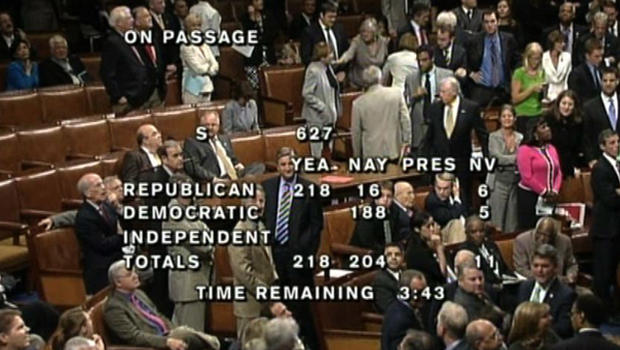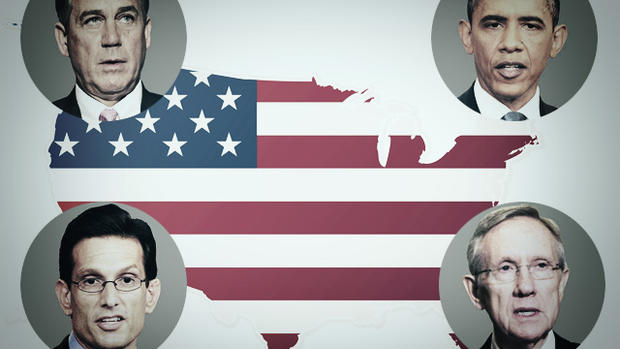House GOP - finally - passes debt limit plan
Updated 8:56 p.m. Eastern Time
UPDATE: The Senate has now voted down the House plan.
(CBS/AP) WASHINGTON - The Democratic-controlled Senate on Friday night killed the House's Republican-backed plan to raise the government's borrowing cap and avert a calamitous U.S. default next week amid a torturous political standoff.
Senate Democrats and several Republicans killed the measure in a 59-41 vote — just minutes after it arrived from the House of Representatives. Democrats opposed the measure because it would require another painful debt-limit debate early next year amid presidential campaigning.
Earlier, House Republicans had narrowly passed an altered version of their plan to raise the debt limit.
The bill passed 218 to 210, with the support of no Democrats. 22 Republicans voted against the bill, including presidential candidates Reps. Michele Bachmann and Ron Paul. Eleven of the 22 no votes were from House freshmen. Republicans needed 216 votes for passage.
House Speaker John Boehner was able to win over skeptical fiscal conservatives by requiring that a second debt ceiling increase roughly six months from now be tied to passage of a balanced budget amendment to the Constitution - something that would require a two thirds majority in both the House and the Senate. Boehner had to cancel a planned vote on the measure last night because he did not have the votes for passage.
The bill will now go to the Senate, where Democrats have vowed to vote it down tonight. They plan to move forward on an alternate plan that would cut around $2 trillion in spending and extend the nation's borrowing authority through 2012. It's not clear that that plan has the 60 votes necessarily get out of the Senate, however, let alone pass the Republican-led House.
Democrats say the House GOP plan, which would reduce spending by $917 billion over ten years, is unacceptable because it would initially only increase the debt limit for about six months. That, they say, will create economic uncertainty, put the United States' Triple-A credit rating at risk and require another difficult debt limit debate during the holiday season.
"Now that yet another political exercise is behind us, with time dwindling, leaders need to start working together immediately to reach a compromise that avoids default and lays the basis for balanced deficit reduction," White House press secretary Jay Carney said in a statement after the vote.
"Senator Reid's proposal is a basis for that compromise," he continued. "It not only achieves more deficit reduction than the bill passed in the House today and puts a process in place to achieve even more savings, it also removes the uncertainty surrounding the risk of default. The President urges Democrats and Republicans in the Senate to find common ground on a plan that can get support from both parties in the House - a plan the President can sign by Tuesday."
Boehner took to the House floor Friday afternoon shortly before the vote, saying he has "worked since the first week of this session... to avoid being where we are right this moment."
Special report: America's debt battle
Boehner said he "stuck my neck out a mile to try to get an agreement with the President of the United States," but that "a lot of people in this town can never say yes." To cheers from his caucus, he called on Democrats and the White House to "end this crisis now."
There is virtually no chance that a Balanced Budget Amendment could get the two-thirds majority necessary for passage in both chambers. (To go into effect, it would also need to be ratified by three-fourths of the states.) If Congress ends up passing some sort of compromise legislation between the Senate and House plans, the Balanced Budget Amendment will almost surely be stripped out.
Video: Default could spike mortgage costs
President Obama on Friday morning urged lawmakers to come to a bipartisan solutionto reach a deal to increase the nation's $14.3 trillion debt limit before Tuesday's deadline.
"The time for putting party first is over. The time for compromise on behalf of the American people is now," Mr. Obama said. "And I'm confident that we can solve this problem."
The addition of the Balanced Budget Amendment provision actually moves the House plan further to the right. But it appears to be the only way for Boehner and his leadership team to save face and pass a Republican version of a bill to raise the debt ceiling in the last days before the deadline is reached.
Mr. Obama dismissed the Republican plan Friday, saying it "has no chance of becoming law." He urged lawmakers to take up a plan from Senate Majority Leader Harry Reid or a plan put forward earlier by Senate Republican leader Mitch McConnell as the basis for a bipartisan agreement.
Reid's plan makes similar cuts to the first step of the Boehner plan, but it also includes about $1 trillion in savings tied to ending the wars in Iraq and Afghanistan -- something the United States is already planning to do. Republicans say the Reid plan is grounded in accounting tricks and doesn't do enough to address the nation's massive deficit and debt problem.
Mr. Obama warned Friday morning that if an agreement isn't reached, the U.S. may lose its Triple-A credit rating "not because we didn't have the capacity to pay our bills -- we do. But because we didn't have a triple-A political system to match our triple-A credit rating."
If the United States' credit rating were downgraded, it would be harder to borrow money, and interest rates would potentially increase across the board. "That's inexcusable," Mr. Obama said. "There are a lot of crises in the world we can't always predict or avoid... This isn't one of those crises."

